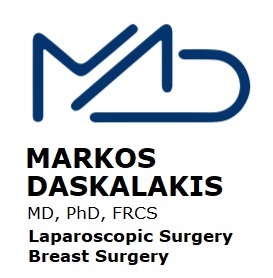During mini gastric bypass, the intestine is not divided but is linked to the small gastric pouch. This procedure is simpler than the Roux-en-Y gastric bypass and therefore might have lower peri-operative complication risks while offering weight loss comparable to the Roux-en-Y gastric bypass.
As with any surgical operation there are associated short and long-term complications such as internal bleeding (1%), anastomotic leak (0.5-1%), blood clot in the legs (deep vein thrombosis; DVT) or in the lung (pulmonary embolism), infection, malabsorption of vitamins and micronutrients, internal hernia, anastomotic ulcer, and weight regain. The connection between the stomach pouch and the small intestine is tested at the end of surgery with a blue dye to ensure “no leak”, but until it has fully healed (which takes 4-6 weeks) you should strictly follow the diet advice you will receive on discharge. To prevent clots, we advise that you keep the elastic stockings we give you and to take the low molecular weight heparin injections for few days after leaving the hospital. Physical activity is also encouraged from the first postoperative hours. We routinely close the mesenteric defect created when a mini gastric bypass is constructed in order to reduce the risk of future internal small bowel herniation and bowel obstruction. However, that risk cannot be eliminated completely (1-2%).




